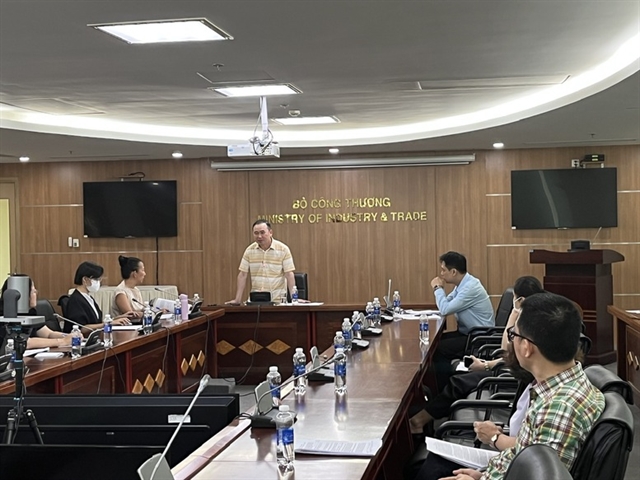
|
| The Ministry of Industry and Trade’s domestic market department held a meeting with businesses and industry groups in the South on Tuesday to discuss the challenges they face, boost consumption and promote trade in HCM City. — Photo baochinhphu.vn |
HCM CITY — The Ministry of Industry and Trade’s domestic market department held a meeting with businesses and industry groups in the South on Tuesday to discuss the challenges they face, boost consumption and promote trade in HCM City.
According to the department, demand has slowed down since 2021 due to various factors impacting business activities and household incomes, leading to reduced consumption.
Retail sales and services have been growing by only 7.2 per cent a year, much lower than the target of 13-13.5 per cent set in “the domestic trade development strategy until 2030.”
Nguyễn Thị Ngọc Huệ, external relations director of AEON Việt Nam, said despite a retail boom in 2022 post-COVID, there were challenges with a market slowdown last year due to rising logistics and raw material costs.
Besides, consumer preferences are shifting towards organic and healthy products, she added.
Nguyễn Thị Thu Hiền, central and southern external relations director of Central Retail Việt Nam, agreed that consumer habits have changed post-pandemic, forcing businesses to adapt and enhance promotions to boost sales.
Phan Văn Chinh, director of the domestic market department, said to support domestic businesses his agency has coordinated with local authorities to organise market stabilisation programmes, One Commune – One Product (OCOP) sales locations and sales events during holidays and festivals.
Chinh said the authourities also encourage large distributors, cooperatives and wholesale markets to develop programmes to support the purchase and processing of local speciality products.
These are aimed at helping indigenous products reach the domestic market and access to international distribution channels.
But distributors said there are difficulties in connecting with local producers due to fragmented operations, making it challenging to buy and sell products.
This is because small businesses often struggle to meet production capacity, quality standards and packaging requirements, while high logistics costs further complicate the supply chain.
Businesses said local authorities could help by providing additional support for OCOP products for their transportation or appoint representatives to facilitate links between local producers and large retailers.
Businesses and distributors also suggested that local promotional programmes should be shorter and more focused to effectively boost domestic consumption. — VNS
- Reduce Hair Loss with PURA D’OR Gold Label Shampoo
- Castor Oil Has Made a “Huge” Difference With Hair and Brow Growth
- Excessive hair loss in men: Signs of illness that cannot be subjective
- Dịch Vụ SEO Website ở Los Angeles, CA: đưa trang web doanh nghiệp bạn lên top Google
- Nails Salon Sierra Madre
 VnExpress News The News Gateway of Vietnam
VnExpress News The News Gateway of Vietnam




